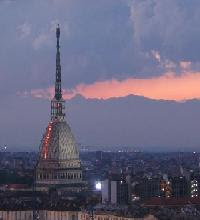+-+Front+cover.jpg)
“Spirit of Eden” fu pubblicato nel 1988 ed è in genere considerato il capolavoro dei Talk Talk, con il suo perfetto abbinamento di rock, jazz, musica classica e ‘ambient music’. L’album fu composto interamente dal cantante-tastierista-chitarrista Mark Hollis e dal polistrumentista Rim Friese-Greene ed eseguito dalla band insieme ad una nutrita schiera di musicisti che suonavano strumenti di vario genere.
Rispetto ai lavori precedenti dei Talk Talk, “Spirit of Eden” non fu certamente un successo dal punto di vista commerciale; tuttavia, molti critici lo hanno lodato senza indugi, considerandolo essenziale per i futuri sviluppi del movimento ‘post-rock’ degli anni Novanta (al pari del successivo “Laughing stock”, da me postato l’8 settembre 2008). I testi, scritti da Mark Hollis, contengono allusioni di carattere religioso e spirituale: pur ammettendone il carattere ‘religioso’, lo stesso Hollis affermò di non essersi basato su un credo religioso in particolare, bensì su un vago concetto di ‘umanesimo’.
La natura sperimentale e ‘lunatica’ dell’album rende difficile apprezzarlo appieno ad un primo ascolto: io stesso ebbi l’impressione, quando lo ascoltai la prima volta, che i Talk Talk avessero buttato giù l’album rappezzando qui e là frammenti musicali in ordine casuale e sparso. Tuttavia, ascoltandolo più volte, iniziai ad apprezzare la natura evocativa di “Spirit of Eden”, un album che considero - anche per il fatto di essere, dopo tutto, un appassionato di rock progressivo - uno dei migliori album degli anni Ottanta.
Rispetto ai lavori precedenti dei Talk Talk, “Spirit of Eden” non fu certamente un successo dal punto di vista commerciale; tuttavia, molti critici lo hanno lodato senza indugi, considerandolo essenziale per i futuri sviluppi del movimento ‘post-rock’ degli anni Novanta (al pari del successivo “Laughing stock”, da me postato l’8 settembre 2008). I testi, scritti da Mark Hollis, contengono allusioni di carattere religioso e spirituale: pur ammettendone il carattere ‘religioso’, lo stesso Hollis affermò di non essersi basato su un credo religioso in particolare, bensì su un vago concetto di ‘umanesimo’.
La natura sperimentale e ‘lunatica’ dell’album rende difficile apprezzarlo appieno ad un primo ascolto: io stesso ebbi l’impressione, quando lo ascoltai la prima volta, che i Talk Talk avessero buttato giù l’album rappezzando qui e là frammenti musicali in ordine casuale e sparso. Tuttavia, ascoltandolo più volte, iniziai ad apprezzare la natura evocativa di “Spirit of Eden”, un album che considero - anche per il fatto di essere, dopo tutto, un appassionato di rock progressivo - uno dei migliori album degli anni Ottanta.
Voto personale (insufficiente / sufficiente / buono / distinto / ottimo / eccellente): Distinto/Ottimo.
Released in 1988, “Spirit of Eden” is considered to be Talk Talk’s masterpiece album, combining elements of rock, jazz, classical music and ambient music. It was composed entirely by Mark Hollis and Rim Friese-Greene and performed by the Talk Talk together with a host of numerous musicians playing a large number of instruments.
Compared to the band’s previous releases, “Spirit of Eden” was not a commercial success; however, many critics praise the album and consider it to have been influential to the post-rock movement of the 1990s, just like the band’s subsequent release “Laughing stock” (refer to my post dated September 8th, 2008). The lyrics, written by Mark Hollis, contain religious and spiritual references: though Hollis himself acknowledged that his lyrics were religious, he said they were not based on a specific religion, preferring to think of them as “humanitarian”.
The moody, experimental nature of the album makes it a challenge to be able to ‘catch’ it on the very first listens: in fact, when I myself listened to it for the first time, it seemed to me as if Talk Talk had made this album by simply building up chunks of music in a random, scrambled order. Then, as I listened to “Spirit of Eden” some more times, I began to appreciate the evocative nature of this album which I rate - due to my being a prog rock fan, all things considered - as one of the best releases in the 1980s.
Compared to the band’s previous releases, “Spirit of Eden” was not a commercial success; however, many critics praise the album and consider it to have been influential to the post-rock movement of the 1990s, just like the band’s subsequent release “Laughing stock” (refer to my post dated September 8th, 2008). The lyrics, written by Mark Hollis, contain religious and spiritual references: though Hollis himself acknowledged that his lyrics were religious, he said they were not based on a specific religion, preferring to think of them as “humanitarian”.
The moody, experimental nature of the album makes it a challenge to be able to ‘catch’ it on the very first listens: in fact, when I myself listened to it for the first time, it seemed to me as if Talk Talk had made this album by simply building up chunks of music in a random, scrambled order. Then, as I listened to “Spirit of Eden” some more times, I began to appreciate the evocative nature of this album which I rate - due to my being a prog rock fan, all things considered - as one of the best releases in the 1980s.
My personal mark (poor / pass / good / fairly good / very good / excellent): Fairly/Very good.
TALK TALK (1988):
Mark Hollis - voce, tastiere, chitarra (vocals, keyboards, guitar)
Tim Friese-Greene - tastiere, armonium, chitarra (keyboards, harmonium, guitar)
Lee Harris -– batteria (drums)
Paul Webb -basso (bass guitar)
Tim Friese-Greene - tastiere, armonium, chitarra (keyboards, harmonium, guitar)
Lee Harris -– batteria (drums)
Paul Webb -basso (bass guitar)
TRACK LIST:
1. The rainbow (Eded / Desire)
2. Inheritance
3. I believe in you
4. Wealth
2. Inheritance
3. I believe in you
4. Wealth
SPIRIT OF EDEN (TALK TALK) - 75,5 MB
+-+Front+cover.JPG)
+-+Asia+(Front+cover).jpg)
+-+Front+cover.jpg)



















